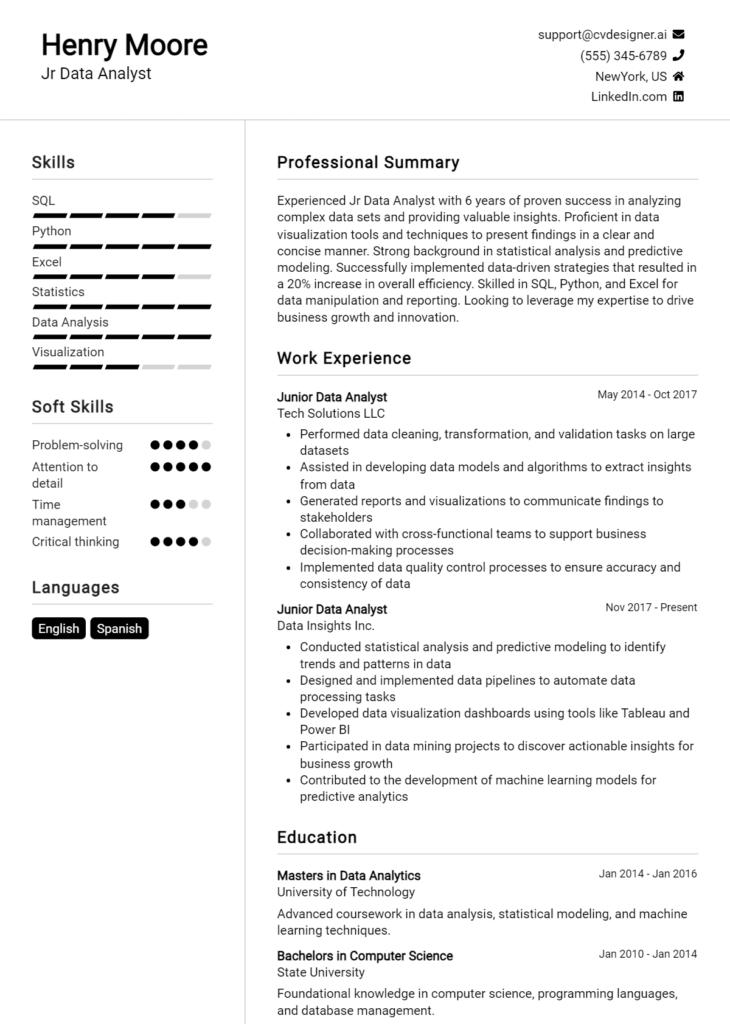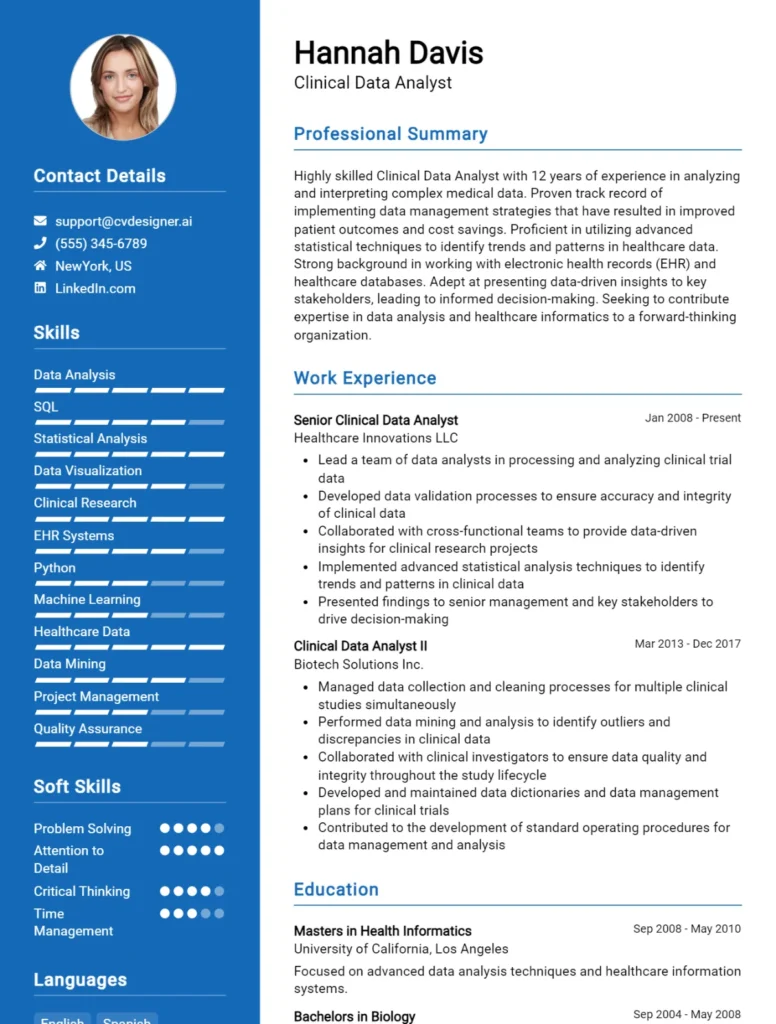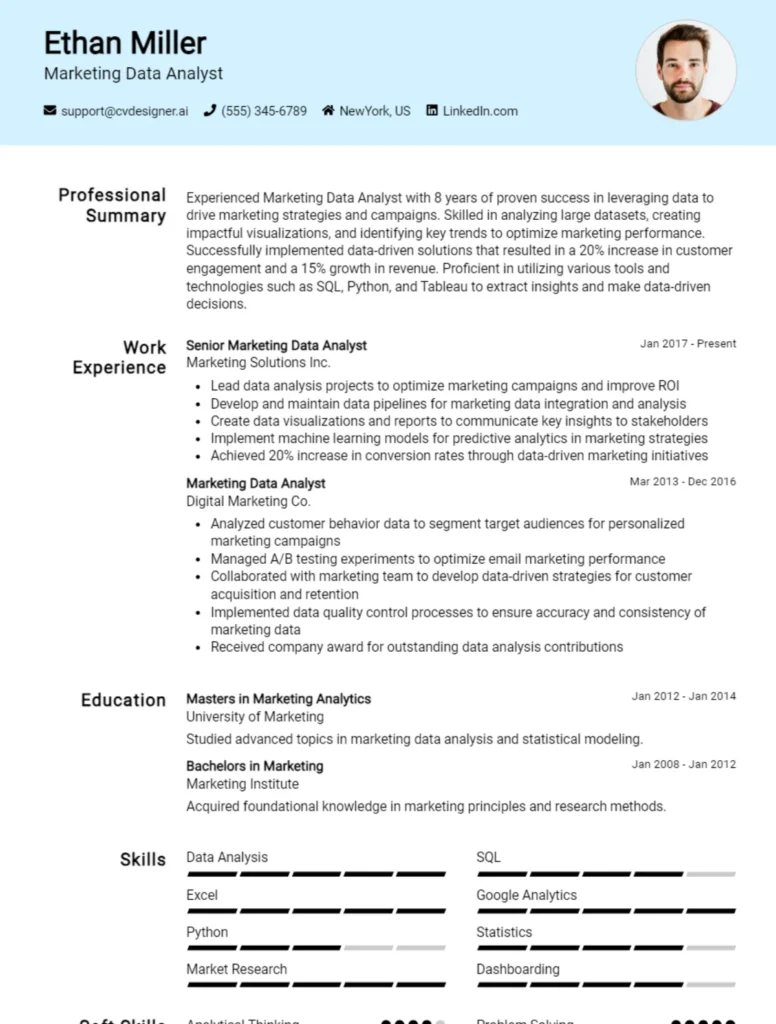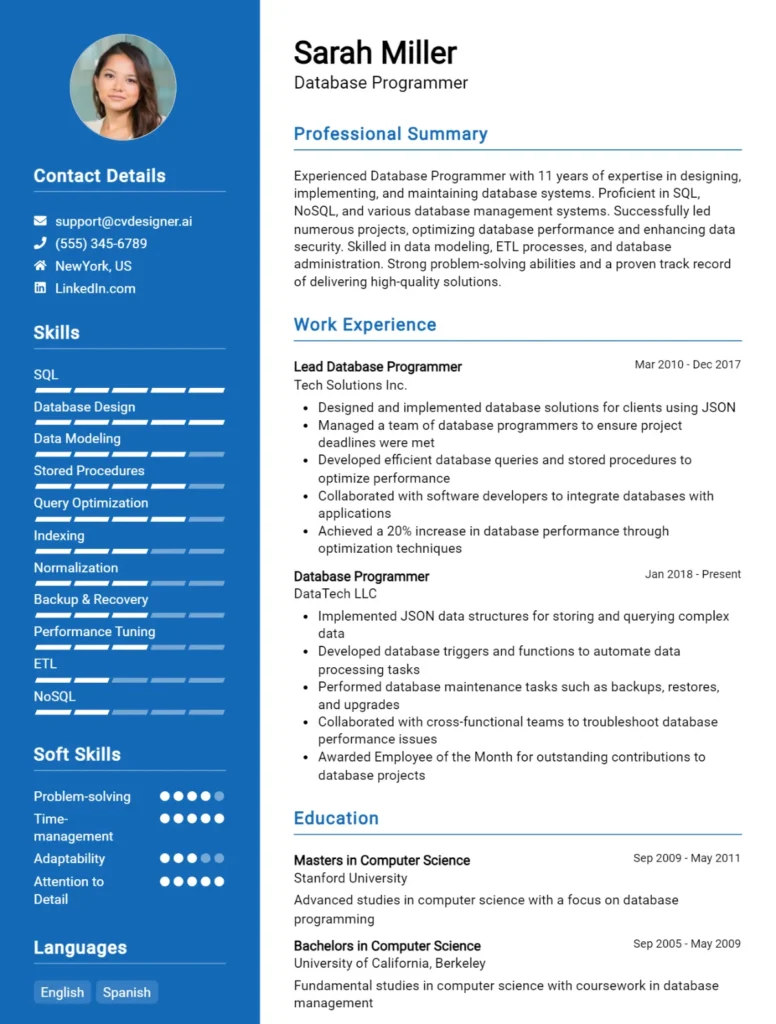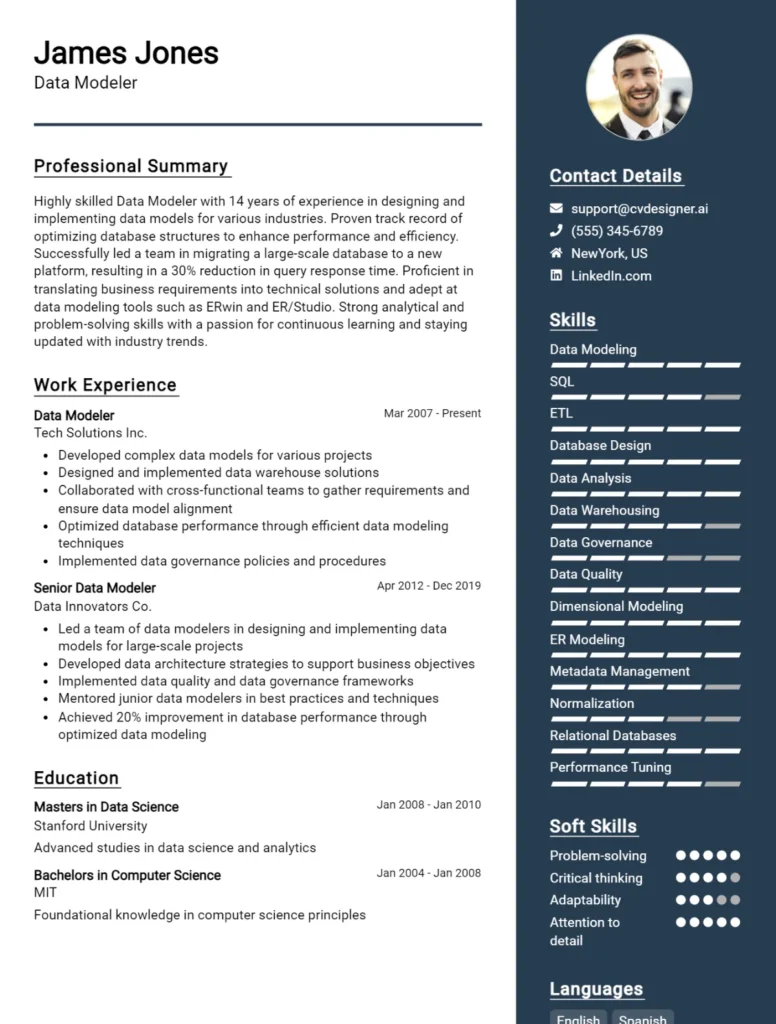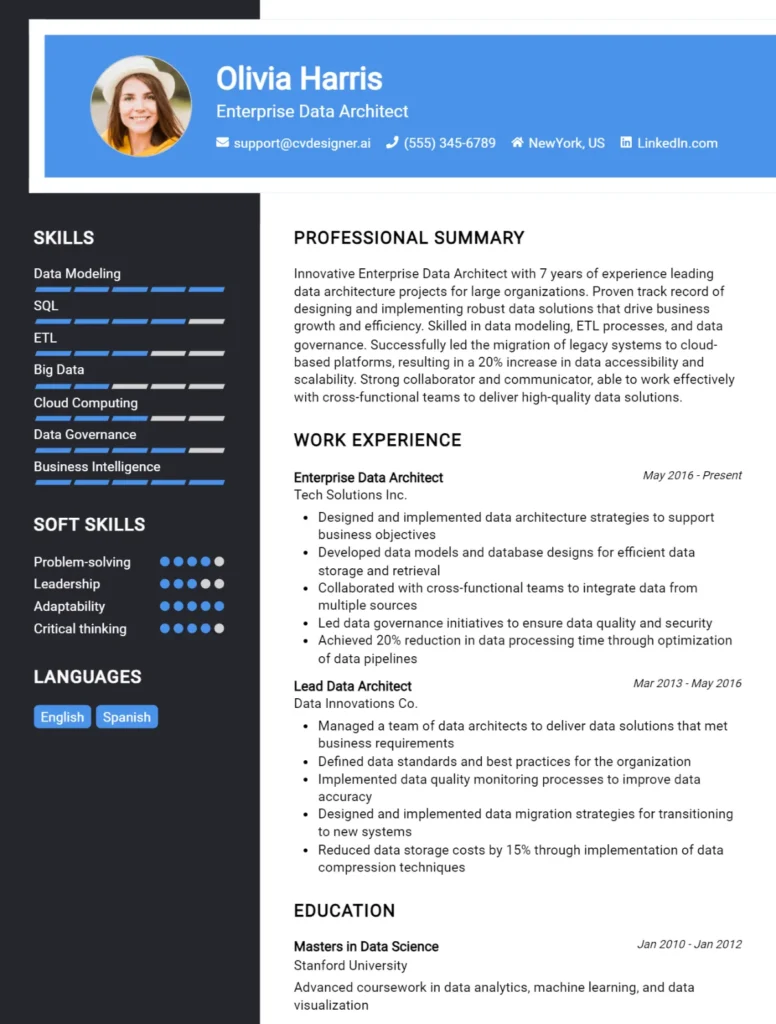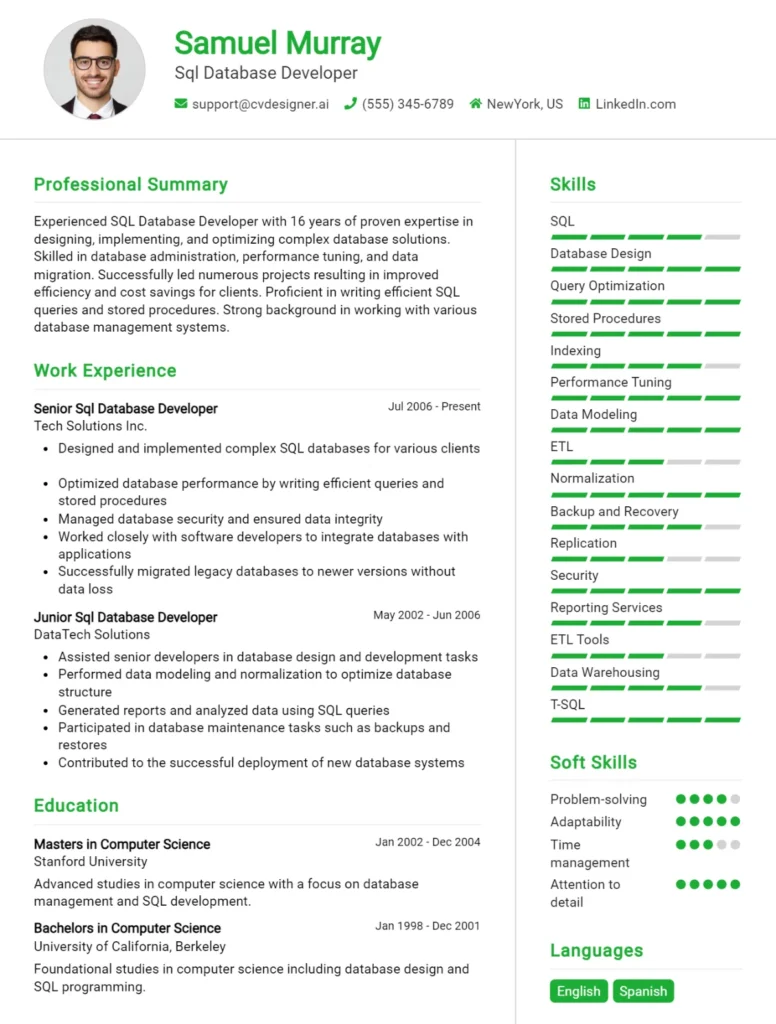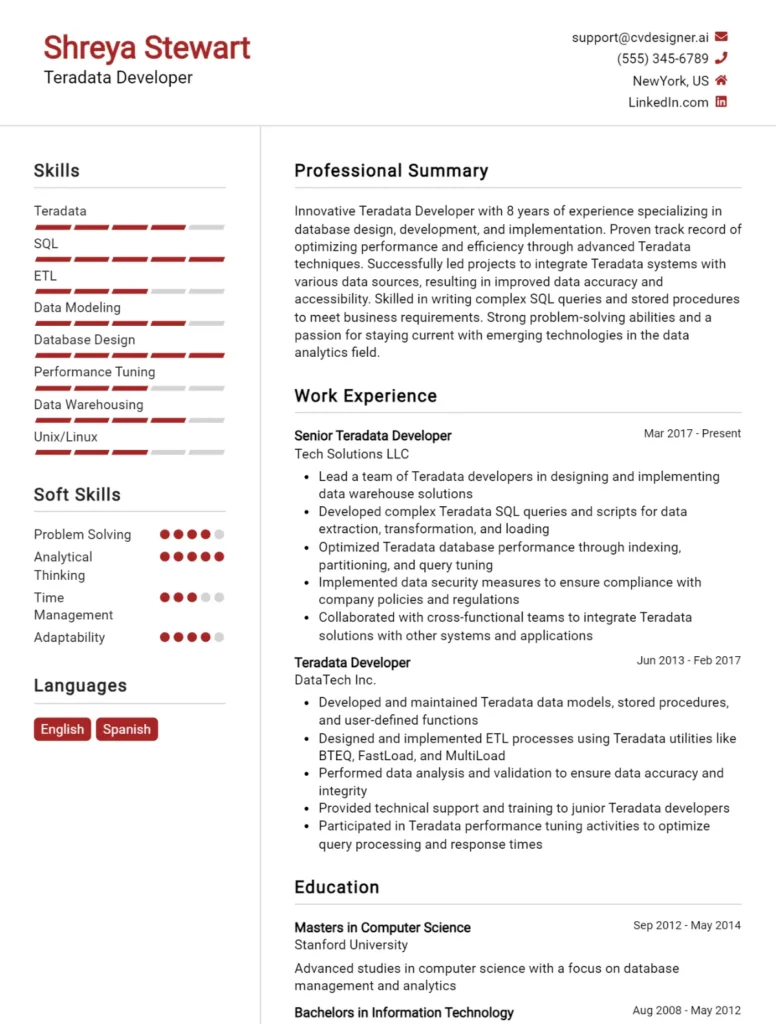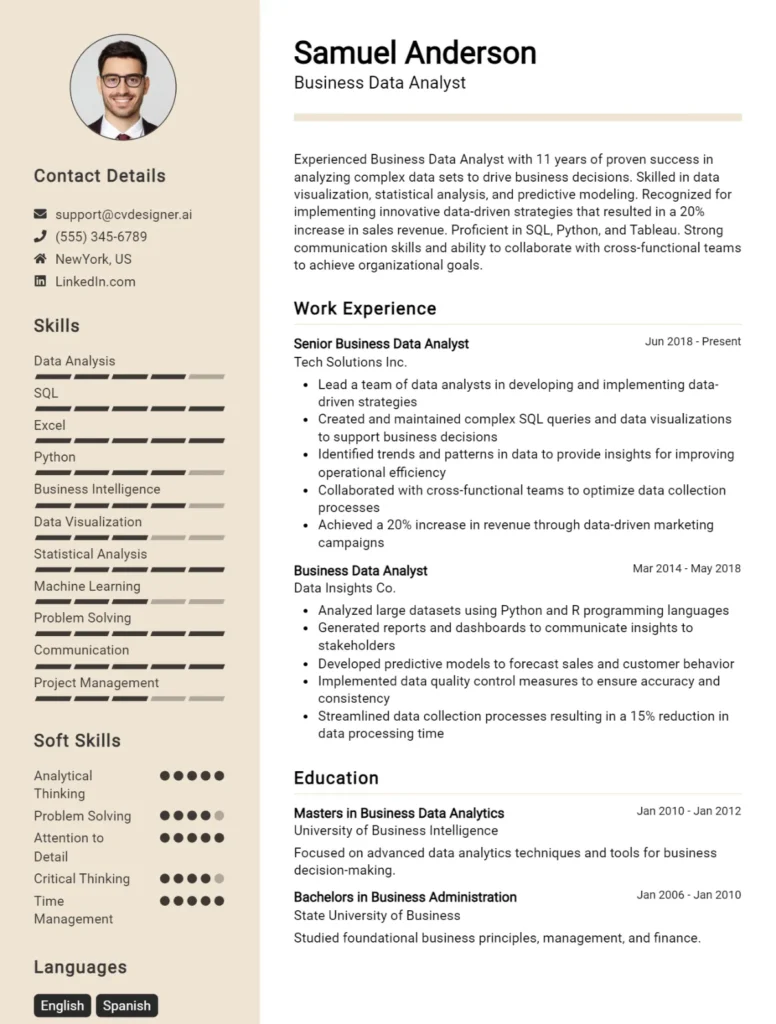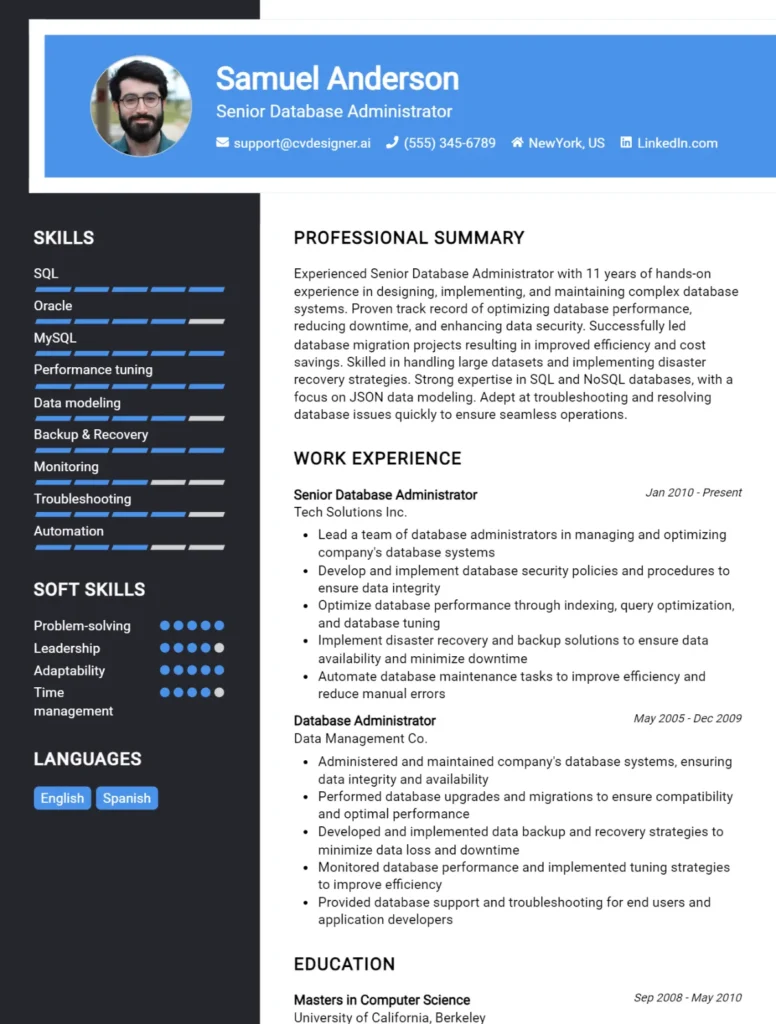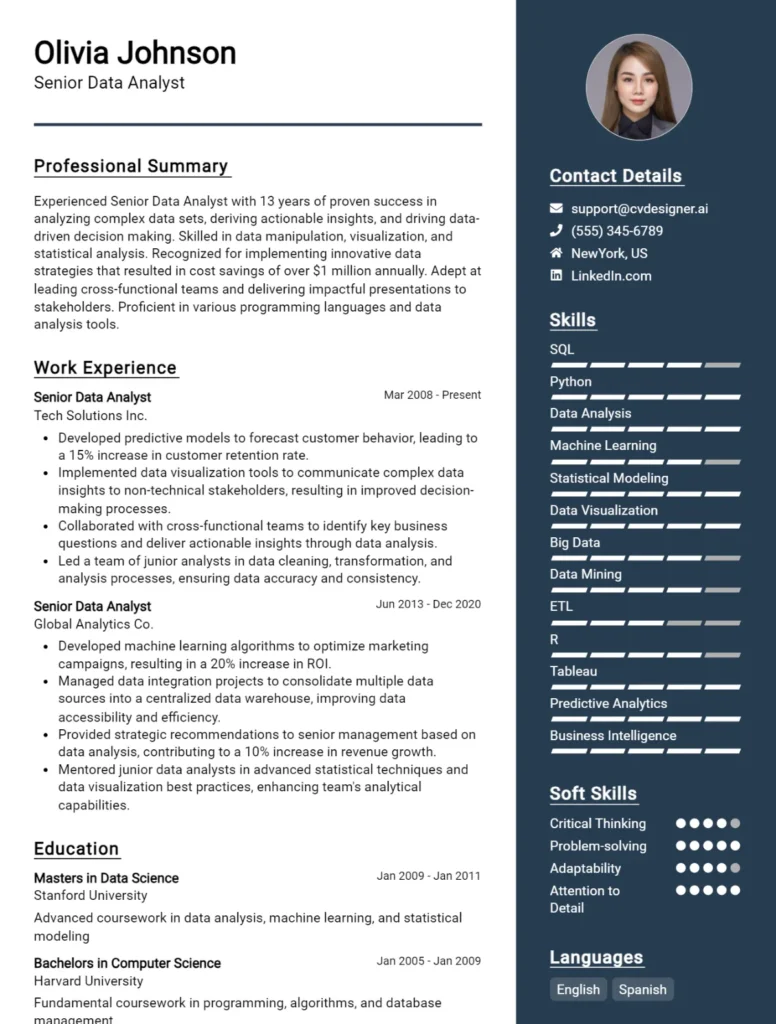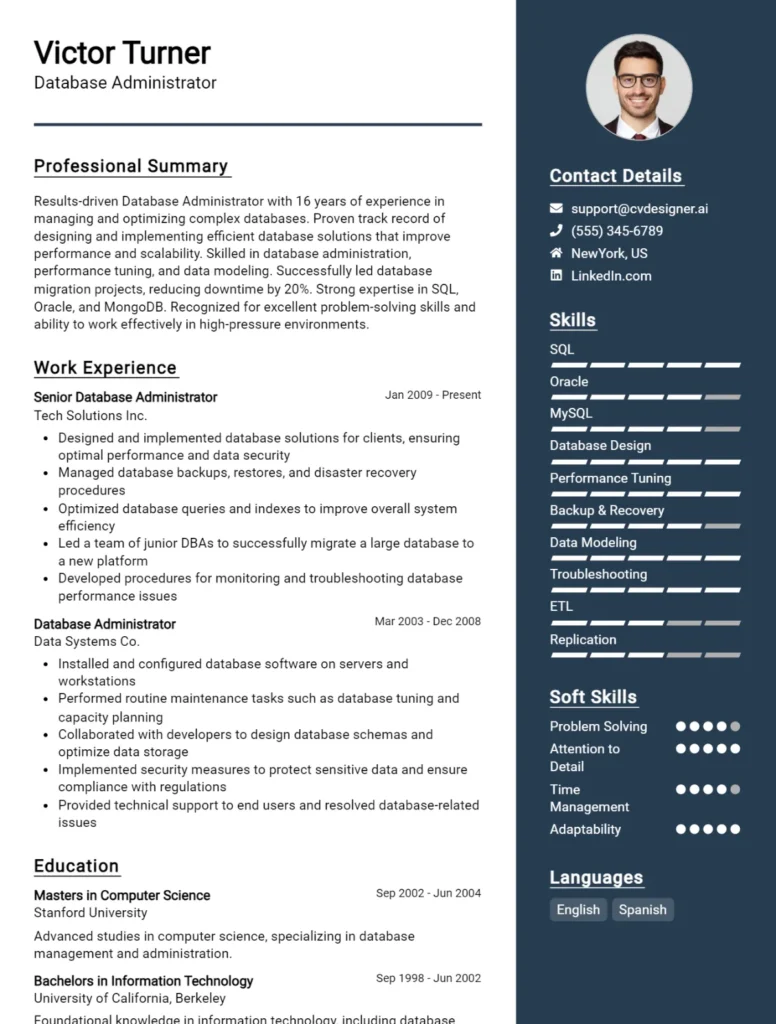Most Popular Data Analyst CV Examples
Explore additional Data Analyst CV samples and guides and see what works for your level of experience or role.
As the demand for data-driven decision-making continues to rise across industries, the role of a Data Analyst has become increasingly pivotal. Crafting an exceptional CV is your first step towards landing that coveted position. In this guide, we will walk you through essential tips and strategies to help you create a compelling CV that stands out in a competitive job market. Whether you’re an experienced professional or just starting your career, this article will provide you with valuable insights and practical advice. You’ll discover how to effectively showcase your skills, highlight relevant experience, and make a lasting impression on potential employers. Here are the key points we'll cover:
- Understanding the core responsibilities of a Data Analyst
- Key skills and qualifications to highlight in your CV
- Structuring your CV for clarity and impact
- Tailoring your CV for specific job applications
- Tips for incorporating data visualization and metrics
- Crafting a strong professional summary and objective
- Examples of effective CVs and what makes them successful
Dive into this comprehensive guide and equip yourself with the knowledge to create an outstanding CV that captures the attention of hiring managers!
What is a Data Analyst CV?
A Data Analyst CV is a crucial document that outlines an individual's skills, experiences, and qualifications relevant to the field of data analysis. It serves as a marketing tool that showcases the candidate's proficiency in interpreting and analyzing complex datasets, utilizing statistical software, and delivering actionable insights to drive business decisions. A well-crafted CV highlights not only technical skills, such as proficiency in programming languages like Python or R and experience with data visualization tools, but also soft skills like critical thinking and problem-solving capabilities. For more detailed guidance on how to structure your CV effectively, check out our cv writing guide.
The importance of a Data Analyst CV cannot be overstated, as it often serves as the first impression a potential employer has of a candidate. A compelling CV can set you apart in a competitive job market, emphasizing your analytical abilities and relevant accomplishments. Including quantifiable achievements, such as improved data processing efficiency or successful project outcomes, can significantly enhance your appeal to recruiters. Additionally, using a professional cv maker can simplify the design process, allowing you to focus on content while ensuring your CV is visually appealing and well-organized.
Key Components of a Data Analyst CV
- Contact Information: Include your name, phone number, email address, and LinkedIn profile link at the top of your CV.
- Professional Summary: A brief statement highlighting your experience, skills, and what you can bring to the role of a Data Analyst.
- Skills: List your relevant skills, such as data visualization, statistical analysis, and proficiency in tools like SQL, Python, or R.
- Work Experience: Detail your previous roles with a focus on work experience that showcases your analytical skills, including specific achievements and projects.
- Education: Include your degree(s), major(s), and the institutions you attended, along with any relevant certifications or coursework.
- Technical Skills: Highlight specific software and tools you are proficient in, such as Excel, Tableau, or Power BI.
- Projects: Describe relevant data analysis projects you have worked on, emphasizing your role and the impact of the results.
- Certifications: List any professional certifications related to data analysis, such as Certified Analytics Professional (CAP) or Google Data Analytics Certificate.
- Soft Skills: Mention important soft skills like critical thinking, communication, and problem-solving, which are vital for a Data Analyst.
- Publications or Presentations: If applicable, include any relevant articles, papers, or presentations you've authored or contributed to.
- Professional Affiliations: Include memberships in relevant organizations, such as the American Statistical Association (ASA) or Data Science Society.
- References: Optionally, state that references are available upon request or provide contact information for references if required.
Sample Data Analyst CV for Inspiration
John Doe
123 Main Street
New York, NY 10001
(123) 456-7890
john.doe@email.com
LinkedIn: linkedin.com/in/johndoe
Professional Summary
Detail-oriented Data Analyst with over 5 years of experience in interpreting and analyzing data to drive successful business solutions. Proficient in a variety of analytical tools and statistical software, with a strong background in data mining, data cleansing, and data visualization. Proven ability to leverage data analytics to enhance operational efficiency and guide strategic planning. Seeking to contribute analytical expertise to a dynamic team in a challenging environment.
Work Experience
Data Analyst
ABC Corporation, New York, NY
June 2020 - Present
- Developed and maintained dashboards and reports using Tableau and Power BI, resulting in a 30% increase in data visibility for stakeholders.
- Collaborated with cross-functional teams to identify business needs and provide actionable insights through data analysis and visualization.
- Conducted A/B testing and statistical analyses to assess the impact of marketing campaigns, leading to a 15% increase in customer engagement.
- Automated data collection processes, reducing reporting time by 40% and allowing for real-time decision-making.
Junior Data Analyst
XYZ Solutions, New York, NY
January 2018 - May 2020
- Analyzed large datasets to identify trends and patterns, contributing to the development of strategic marketing initiatives and operational improvements.
- Assisted in the creation of predictive models to forecast sales and customer behavior, enhancing the accuracy of business planning.
- Prepared detailed reports and presentations for management, summarizing findings and providing recommendations for process enhancements.
- Utilized SQL to extract, manipulate, and analyze data from various databases, ensuring data integrity and accuracy.
Intern Data Analyst
Tech Innovations, New York, NY
June 2017 - December 2017
- Supported senior analysts in data collection and analysis for various projects, gaining hands-on experience in data management and reporting.
- Conducted preliminary data analysis and assisted in the preparation of client presentations to showcase analytical findings.
- Learned to use Excel for data visualization and to create informative charts and graphs for easy interpretation of data.
Education
Bachelor of Science in Data Science
University of New York, New York, NY
Graduated: May 2017
Skills
- Data Visualization: Tableau, Power BI, Excel
- Programming Languages: Python, R, SQL
- Statistical Analysis: Regression analysis, A/B testing, hypothesis testing
- Data Management: Data cleaning, data mining, ETL processes
- Soft Skills: Problem-solving, critical thinking, communication, teamwork
Publications
- Doe, J. (2022). "Leveraging Big Data for Business Growth." Journal of Data Science and Analytics.
- Doe, J. (2021). "The Role of Data Analytics in Decision-Making." International Journal of Business Intelligence.
Certifications
- Certified Analytics Professional (CAP) - 2021
- Microsoft Certified: Data Analyst Associate - 2020
- Google Data Analytics Professional Certificate - 2019
Data Analyst CV Writing Tips
When crafting a CV for a Data Analyst position, it's essential to present a clear and concise overview of your skills, experiences, and accomplishments in a way that aligns with the requirements of the role. Focus on demonstrating your analytical abilities and proficiency with relevant tools and technologies. Tailor your CV to highlight specific projects and outcomes that showcase your problem-solving skills and your capacity to derive insights from data. Use quantifiable achievements to illustrate your impact, and ensure that your CV is well-organized and easy to read.
CV Writing Tips for Data Analysts:
- Use Keywords: Incorporate industry-specific keywords and phrases from the job description to pass through applicant tracking systems (ATS).
- Quantify Achievements: Whenever possible, use numbers to demonstrate your impact, such as "increased sales by 20% through data-driven marketing strategies."
- Highlight Technical Skills: Clearly list your proficiency in data analysis tools (e.g., SQL, Python, R, Excel) and visualization software (e.g., Tableau, Power BI).
- Showcase Projects: Include a section on relevant projects or case studies that demonstrate your analytical skills and knowledge of data methodologies.
- Educational Background: Emphasize relevant degrees, certifications (e.g., Google Data Analytics Certificate), and coursework that pertain to data analysis.
- Focus on Problem-Solving: Describe how you have used data to solve specific business problems or enhance decision-making processes.
- Keep It Concise: Aim for a one-page CV if you have less than 10 years of experience; be succinct and avoid unnecessary jargon.
- Professional Format: Use a clean, professional layout with clear headings and bullet points to make your CV easy to skim and aesthetically pleasing.
Data Analyst CV Summary Examples
As a Data Analyst, creating a compelling CV summary is crucial to capture the attention of potential employers. A well-crafted summary highlights your skills, experience, and unique contributions in the field of data analysis. Here are some examples to consider for your CV:
Results-driven Data Analyst with over 5 years of experience in interpreting and analyzing complex datasets. Proven track record of delivering actionable insights that drive business growth, enhance operational efficiency, and support strategic decision-making.
Detail-oriented Data Analyst skilled in utilizing advanced statistical techniques and data visualization tools to identify trends and patterns. Adept at transforming raw data into meaningful information, with a strong ability to communicate findings to both technical and non-technical stakeholders.
Dedicated Data Analyst with expertise in SQL, Python, and data mining. Committed to leveraging data analytics to solve business problems and optimize processes. Strong collaborator with a passion for data-driven decision-making and a knack for turning insights into strategic recommendations.
Enthusiastic Data Analyst with a background in finance and strong analytical skills. Experienced in developing dashboards and reports that facilitate data-driven strategies. Eager to apply knowledge of machine learning algorithms to enhance data analysis processes and drive innovation.
Dynamic Data Analyst with a solid foundation in statistical analysis and data interpretation. Proficient in using tools such as R and Tableau to visualize data insights. Known for a proactive approach to problem-solving and a commitment to delivering high-quality analytical solutions.
Build a Strong Experience Section for Your Data Analyst CV
As a Data Analyst, showcasing your work experience effectively is crucial to catching the attention of potential employers. The experience section should highlight your analytical skills, problem-solving abilities, and specific contributions to past employers. Here are several examples of how to frame your work experience to demonstrate your expertise and impact in the field:
- Analyzed large datasets using SQL and Python to identify trends and patterns that informed strategic business decisions, resulting in a 15% increase in customer retention rates.
- Developed and maintained interactive dashboards using Tableau, providing real-time insights to stakeholders and enabling data-driven decision-making across various departments.
- Collaborated with cross-functional teams to design and implement A/B testing frameworks for marketing campaigns, which improved conversion rates by 20% through data-driven optimizations.
- Conducted thorough data cleaning and preprocessing on complex datasets, ensuring high data quality and integrity for accurate analysis and reporting.
- Presented analytical findings to senior management through detailed reports and presentations, facilitating informed decision-making and strategic planning.
- Implemented automated reporting processes using Python scripts, reducing the time spent on data reporting by 30% and increasing the frequency of insights delivered to the team.
- Utilized statistical techniques to perform predictive modeling and forecasting, enabling the company to proactively address market trends and customer needs.
- Led workshops on data literacy for non-technical staff, enhancing the organization's overall data culture and empowering team members to leverage data in their daily operations.
Data Analyst CV Education Examples
As a Data Analyst, having a strong educational background is crucial for developing the necessary skills to interpret and analyze complex datasets. Below are several examples of educational qualifications that are particularly relevant for individuals pursuing a career in data analysis:
- Bachelor's Degree in Data Science
This degree provides a solid foundation in statistical analysis, data mining, and predictive modeling, equipping graduates with the technical skills necessary for effective data interpretation. - Bachelor's Degree in Statistics
A statistics degree offers in-depth knowledge of statistical methods, probability theory, and data analysis techniques, which are essential for making data-driven decisions. - Bachelor's Degree in Computer Science
This program covers programming languages, algorithms, and database management, all of which are vital for manipulating and analyzing large datasets. - Master's Degree in Business Analytics
A master's in business analytics combines data analysis with business strategy, helping graduates understand how to leverage data for organizational growth and decision-making. - Certification in Data Analysis or Data Visualization
Professional certifications from recognized institutions can provide specialized training in tools and techniques used in data analysis, such as SQL, Python, R, and Tableau, enhancing employability in the field.
Skills to Highlight in Your Data Analyst CV
As a Data Analyst, showcasing the right combination of skills on your CV is essential to demonstrate your capability to interpret and analyze complex data sets effectively. Employers look for a blend of analytical prowess and interpersonal skills that enable you to work collaboratively and communicate insights clearly. Below is a list of vital soft and hard skills that can enhance your Data Analyst CV and set you apart in the competitive job market.
Soft Skills:
- Problem-Solving: Ability to identify issues and find effective solutions through data-driven insights.
- Communication: Proficient in conveying technical information to non-technical stakeholders clearly and concisely.
- Attention to Detail: Careful attention to data accuracy and integrity in analysis and reporting.
- Critical Thinking: Ability to evaluate data and draw logical conclusions to support decision-making.
- Time Management: Skillful in prioritizing tasks and managing time effectively to meet deadlines.
- Adaptability: Willingness to learn new tools and techniques in a fast-paced and evolving environment.
- Team Collaboration: Experience working effectively within diverse teams to achieve common goals.
- Creativity: Innovative in finding new ways to visualize and interpret data for better insights.
- Empathy: Understanding of the needs and perspectives of different stakeholders when presenting data.
- Organizational Skills: Proficient in managing multiple projects and maintaining structured documentation.
Hard Skills:
- Data Visualization: Proficient in tools like Tableau, Power BI, or Matplotlib to create insightful visual representations.
- Statistical Analysis: Strong understanding of statistical methods and techniques for data interpretation.
- SQL: Experience with querying databases to extract and manipulate data effectively.
- Excel: Advanced skills in Microsoft Excel for data analysis, including pivot tables and formulas.
- Programming Languages: Proficiency in languages such as Python or R for data manipulation and analysis.
- Data Cleaning: Expertise in preprocessing and cleaning data to ensure accuracy and reliability.
- Machine Learning: Familiarity with machine learning algorithms and their applications in data analysis.
- ETL Processes: Understanding of Extract, Transform, Load processes for data integration and management.
- Database Management: Knowledge of database management systems such as MySQL, PostgreSQL, or Oracle.
- A/B Testing: Experience in designing and analyzing A/B tests to evaluate the effectiveness of different strategies.
Data Analyst CV Format
As a Data Analyst, crafting an effective CV is crucial for showcasing your technical skills and analytical abilities. The format you choose can significantly impact how potential employers perceive your qualifications. The best CV format varies depending on your level of experience, whether you're an entry-level candidate, a mid-level professional, or a senior data analyst.
For Entry-Level Data Analysts:
- Use a chronological format to highlight your education and any internships or relevant projects.
- Focus on skills and tools, such as Excel, SQL, or Python, and any certifications you've earned.
- Include a brief summary that emphasizes your enthusiasm for data analysis and willingness to learn.
For Mid-Level Data Analysts:
- Opt for a combination format that showcases both your work experience and skills.
- Highlight specific projects you’ve worked on, including the impact of your analysis on business decisions.
- Detail any leadership roles or mentoring experiences to demonstrate your growth.
For Senior Data Analysts:
- Use a functional format that allows you to emphasize strategic contributions and leadership skills.
- Include a summary statement that outlines your career achievements and areas of expertise.
- Provide insights into your experience with data visualization tools and advanced analytics methods.
For more information on various CV formats, check out this cv format guide.
Common Mistakes to Avoid in a Data Analyst CV
When crafting a CV for a Data Analyst position, it’s crucial to present your skills and experiences clearly and effectively. A well-structured CV can make all the difference in capturing the attention of hiring managers. However, many candidates make common mistakes that can undermine their qualifications and diminish their chances of landing an interview. To help you stand out, here are some pitfalls to avoid when writing your Data Analyst CV:
- Lack of Tailoring: Submitting a generic CV that doesn’t align with the specific job description can lead to missed opportunities. Tailor your CV for each role you apply for.
- Overloading with Technical Jargon: While it's important to showcase your technical skills, using excessive jargon can alienate readers who may not be familiar with certain terms. Aim for clarity.
- Ignoring Soft Skills: Data analysis isn't just about numbers; communication, teamwork, and problem-solving are crucial. Ensure you highlight these abilities alongside technical expertise.
- Inadequate Quantification of Achievements: Failing to quantify your accomplishments can weaken your CV. Use specific metrics to demonstrate the impact of your work, such as percentage improvements or cost savings.
- Poor Formatting: A cluttered or unprofessional layout can distract from your qualifications. Use a clean, organized format with consistent fonts and headings to enhance readability.
- Listing Responsibilities Instead of Achievements: Focus on what you accomplished in your previous roles rather than just listing tasks. Highlighting achievements provides a clearer picture of your contributions.
- Neglecting to Include Relevant Tools and Technologies: Omitting the technical tools and software you’ve used can leave employers uncertain about your capabilities. Be specific about your proficiency with data analysis tools.
- Omitting a Summary Statement: Skipping a summary or objective statement can result in a missed opportunity to present your career goals and unique value proposition upfront.
- Failing to Proofread: Typos and grammatical errors can create a negative impression. Always proofread your CV to ensure it’s polished and professional.
- Not Including Continuous Learning: In a field as dynamic as data analysis, not mentioning ongoing education or certifications can make your CV seem outdated. Highlight any relevant courses, workshops, or certifications you’ve completed.
Key Takeaways for a Data Analyst CV
- Tailor Your CV: Customize your CV for each job application by aligning your skills and experiences with the job description.
- Professional Summary: Start with a compelling summary that highlights your analytical skills, experience, and what you bring to the role.
- Relevant Skills: Include technical skills such as SQL, Python, R, data visualization tools (e.g., Tableau, Power BI), and statistical analysis.
- Quantifiable Achievements: Focus on achievements that can be quantified, such as "Increased data processing efficiency by 30% through automation."
- Education and Certifications: List your educational background and any relevant certifications (e.g., Google Data Analytics, Microsoft Certified: Data Analyst Associate).
- Project Experience: Detail specific projects where you applied data analysis, including the tools used and the outcomes achieved.
- Soft Skills: Highlight essential soft skills like problem-solving, communication, and teamwork, which are crucial for interpreting data and collaborating with stakeholders.
- Professional Affiliations: Mention any memberships in professional organizations or participation in relevant workshops and conferences.
- Use Action Verbs: Start bullet points with strong action verbs such as "Analyzed," "Developed," "Presented," and "Collaborated" to convey your contributions effectively.
- Formatting: Ensure your CV is well-organized and visually appealing. Consider using cv templates for a polished look.
- Cover Letter Integration: Complement your CV with a tailored cover letter. Check out cover letter templates for inspiration.
- Utilize Tools: Take advantage of a cv builder to streamline the CV creation process and enhance your presentation.
Build your CV in minutes
Use an AI-powered cv builder and have your cv done in 5 minutes. Just select your template and our software will guide you through the process.

